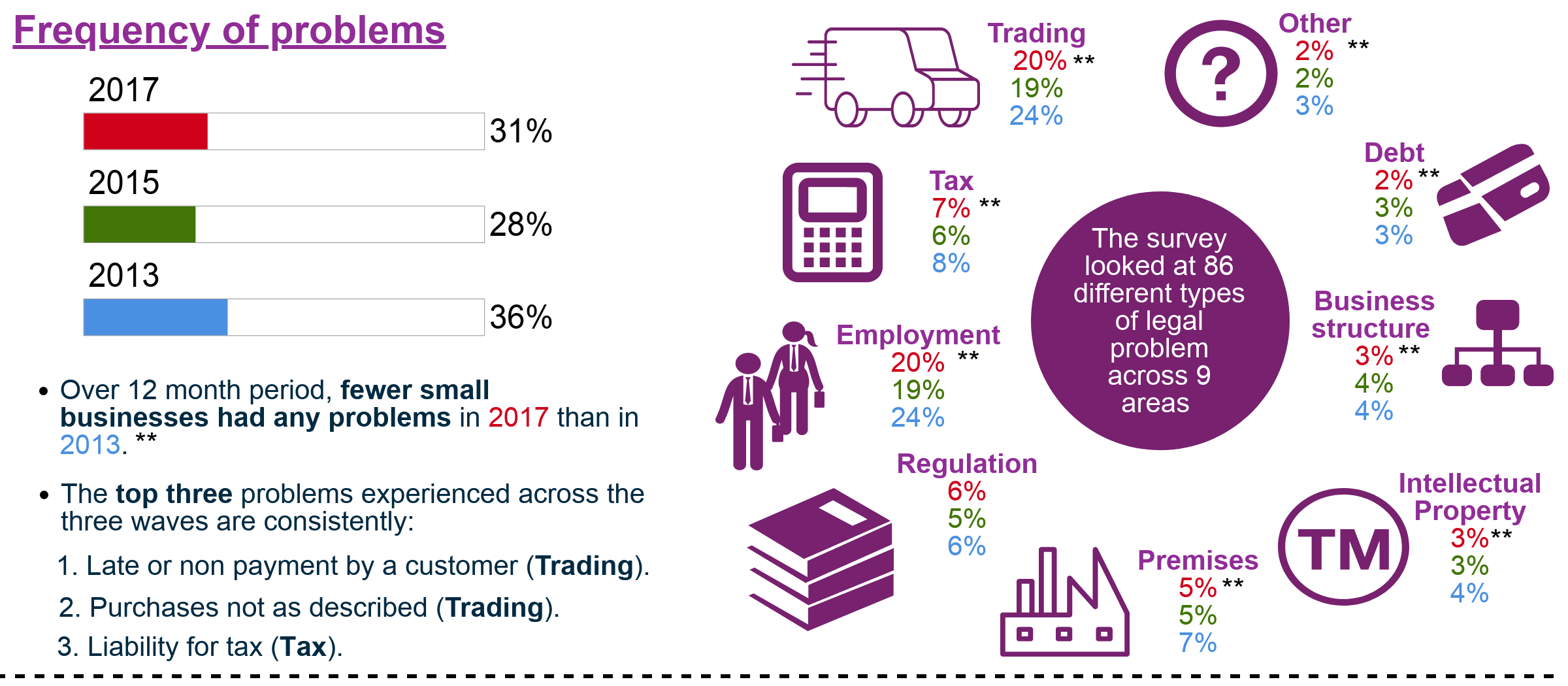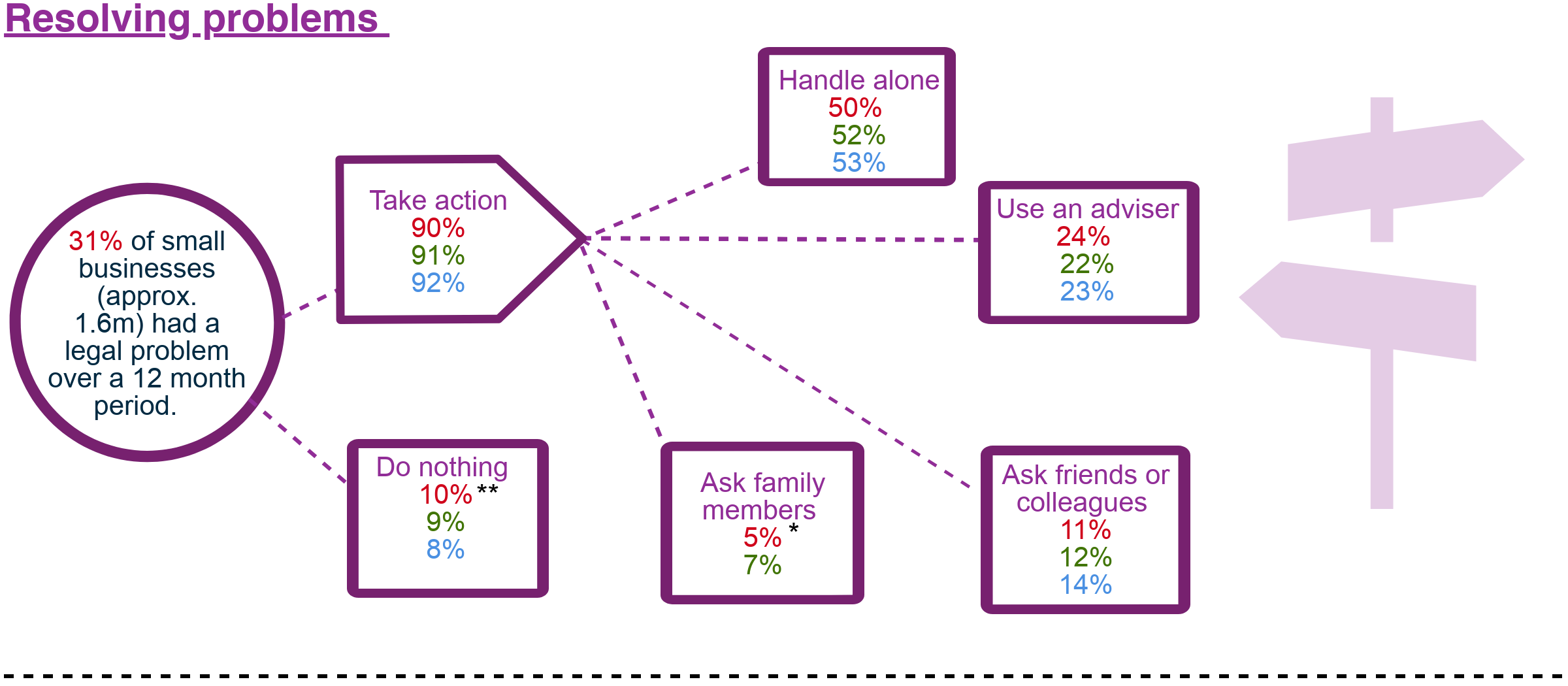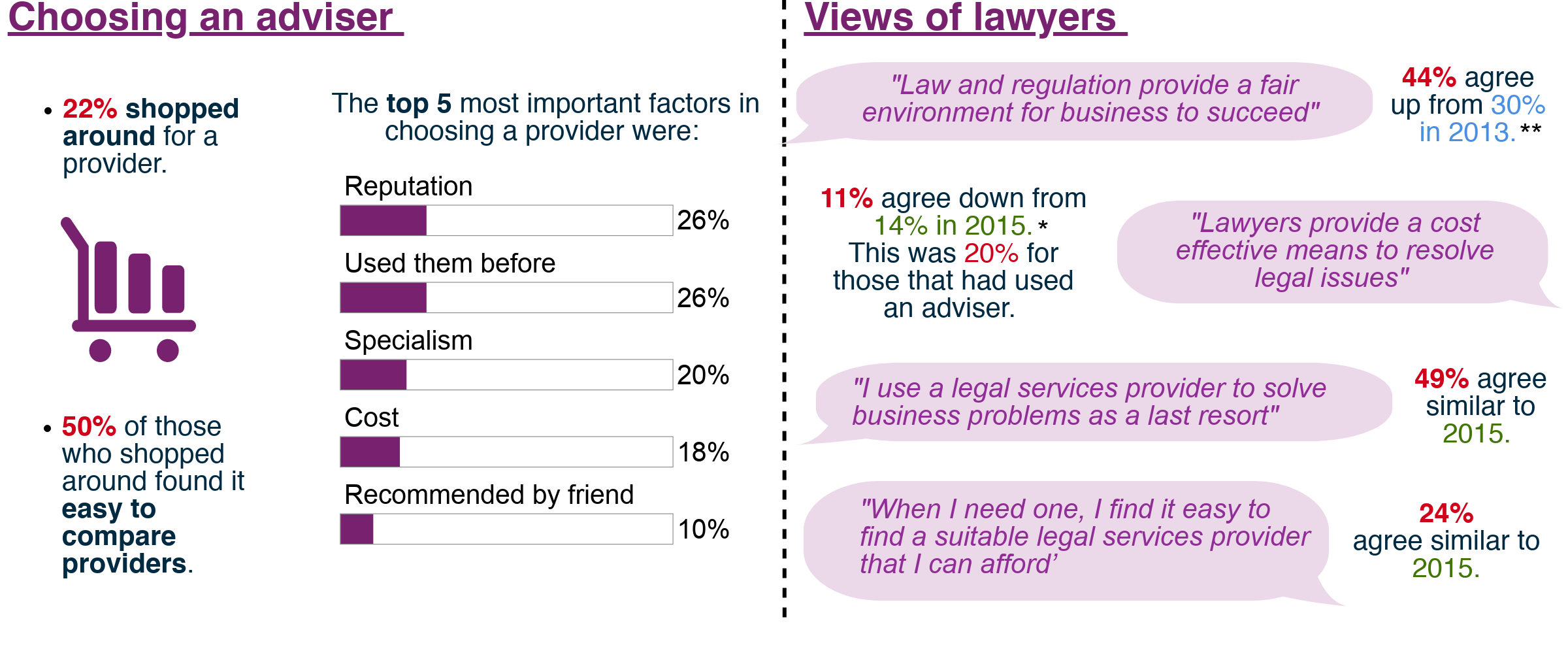
Wednesday, 14 FEBRUARY 2018
LSB publishes its third wave of SMEs’ legal needs research
The Legal Services Board (LSB) today publishes its third research report focusing on the legal needs of small businesses and looks at how their views have changed – and the legal services market has responded – since similar research was conducted in 2013 and in 2015. It is the largest ever survey of small firms' interactions with the legal sector drawing on over 10,000 responses.
The number of small firms in the UK economy continues to increase. In 2016 there were an estimated 5.5 million private sector firms in the UK, an increase of over 250,000 since 2014[1]. Small businesses may have a greater need for external business support than larger businesses, in part due to limited internal resources and experience.
This research tracks how an individual or business responds when faced with a problem that can be resolved using legal processes.
Commenting on the appointment, Dr Helen Phillips said:
"While our research suggests the impact of legal problems on small businesses has decreased the estimated annual cost to the UK economy of their legal problems is still very substantial, at roughly £40bn. More worryingly 20% of businesses reported health impacts for staff from these legal problems, which could affect more than 1m individuals.
There still remains a perception of legal services as expensive – whether or not that perception is accurate – resulting in many businesses either ignoring legal issues or trying to handle them alone. It is hoped that work by regulators and others to implement the CMA recommendations on improving transparency should help address these issues over time.
There are so many opportunities for legal service providers to expand their business if they can tailor their services to what this group of consumers need, raise awareness of their services and overcome perceptions of high cost."
Key findings from today's research include:
Business problems have declined in incidence
- Around a third of small businesses had a legal problem in the preceding 12 months. This represents a fall from 36 percent in 2013 to 31%
- The most frequent issues across the three waves of the survey are:
• late or non-payment for goods or services provided
• goods and services not as described, and
• liability for tax owed. - Around half of small businesses reporting a legal issue said it had a negative impact
- Total annual losses to small businesses due to legal problems is estimated at £40bn, and over 1 million individuals in small businesses suffered ill health.
Engagement with legal service providers remains limited
- There has been a significant increase in the proportion of small businesses doing nothing when experiencing a problem (10%)
- proportions adopting strategies including handling alone (50%) or using an advisor (24%) have changed little between 2013 and 2017
- Less than one in 10 employed in-house lawyers or had a retainer. When advice was sought, accountants were consulted more often than lawyers
- For those that did use a lawyer, 22% shopped around to find a provider. 50% of those who shopped around found it easy to compare different providers.
Views on cost effectiveness of lawyers have not improved
- Just 11% of small businesses agreed that lawyers provide a cost effective means to resolve legal issues - this is down from 14% in 2015
- Satisfaction that law and regulation provide a fair trading environment increased from 30% in 2013 to 44% in 2017.
[1] Business Population Estimates, 2016, Department for Business, Energy & Industrial Strategy
ENDS
For further information, please contact the LSB's Communications Manager, Vincent McGovern (020 7271 0068).
Notes for editors:
- This is the largest ever survey of small firms’ (businesses with up to 50 employees) interactions with the legal sector. It draws on 10,579 online responses from owners and managers of small businesses who have experienced at least one of 86 different legal problems in the last 12 months.
- The survey was undertaken by YouGov. The analysis was undertaken by BMG Research.
- The full report can be accessed here.
- Previous rounds of the research can be found (2015) here and (2013) here.
- Some key statistics from the research include:
Over three quarters (76%) of businesses have no employees, whilst the vast majority have less than 10 employees (96%). This rises to 99% when all small businesses are taken into account (those with less than 50 employees). Small businesses provide nearly half of employment in the UK (48%) and contribute a third of turnover of UK businesses as a whole (33%)..
- The LSB is holding an event on Monday 26 February at its office to discuss the findings of this report and next steps. The Small Business Commissioner Paul Uppal will chair the discussion. This event is free to attend and should be of interest to a wide variety of stakeholders such as business representative groups, regulators, consumer organisations, academics, legal service providers and policy makers in central government and any other interested parties. Should you be interested in attending please get in touch with the LSB here.
- All LSB research data sets collected since 2009 are freely available for anyone to use. They can be accessed here.
- The Legal Services Act 2007 (the Act) created the LSB as a new regulator with responsibility for overseeing the regulation of legal services in England and Wales. The new regulatory regime became active on 1 January 2010.
- The LSB oversees ten approved regulators, which in turn regulate individual legal practitioners. The approved regulators, designated under Part 1 of Schedule 4 of the 2007 Act, are the Law Society, the Bar Council, the Master of the Faculties, the Chartered Institute of Legal Executives, the Council for Licensed Conveyancers, the Chartered Institute of Patent Attorneys, the Chartered Institute of Trade Mark Attorneys, the Association of Costs Lawyers, the Institute of Chartered Accountants in England and Wales and the Association of Chartered Certified Accountants.
In addition, the Institute of Chartered Accountants of Scotland is an approved regulator for probate activities only but does not currently authorise anyone to offer this service.. - As at 1 April 2017, the legal profession in England and Wales comprised 148,690 solicitors, 15,281 barristers, 6,809 chartered legal executives and 5,958 other individuals operating in other areas of the legal profession such as conveyancing. The UK legal sector turnover was £31 billion per annum (2016) which is up 19% in cash terms since 2012. For more information see here.



